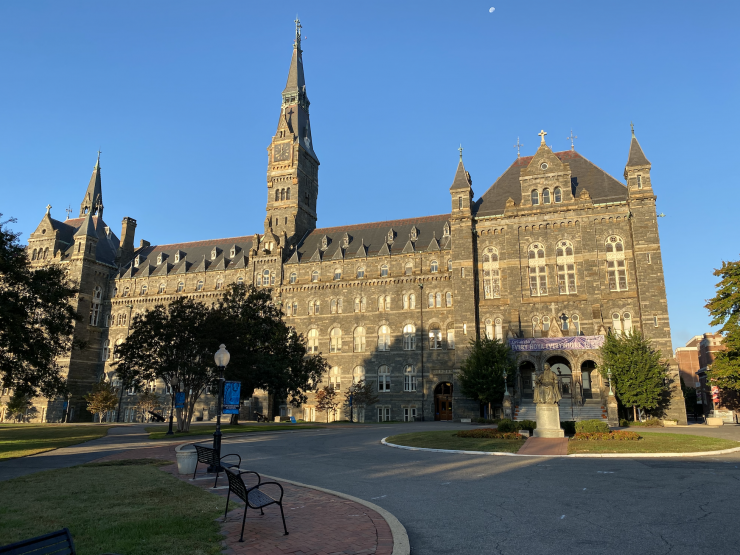Since Georgetown University released its plan for the spring 2021 semester on Nov. 16, undergraduates and graduate students have expressed concern that it fails to address their needs. Members of student organizations at Georgetown say they are frustrated with a wide range of policies outlined by the university administration in anticipation of another semester held virtually.
The spring semester will start Jan. 25 for students on the main campus and end on May 19. About 200 hybrid courses will be offered for graduate students and seniors, President John DeGioia said in a press release. Most of Georgetown’s almost 20,000 students will attend classes online. DeGioia also said the school will partner with WeWork, a chain providing shared workspaces to students who no longer want to work from home but cannot return to campus.
The spring 2021 calendar has been altered to discourage students from traveling in the midst of the worsening pandemic. Instead of a 10-day spring break in March and a six-day Easter break in April, as the university offered this year, the spring 2021 semester will have one compressed break lasting nine days, from March 26 to April 5. For undergraduates, however, classes will begin Jan. 25 to provide extra time between semesters.
Daniella Sanchez, a student senator in the Georgetown University Student Association (GUSA), said students are “outraged” about the lack of breaks throughout the semester.
“After seeing the burnout of this semester, the administration chose the least preferred option by over 500 students who took a survey,” said Sanchez, who is director of COVID response for GUSA. “We are expected to go three straight months without a break. Then, straight through to finals after spring break.”
Sanchez said the administration failed to address the shortcomings of the fall semester in the spring semester plan. She also said the university has not acted to improve mental health resources despite “repeated testimonies about the declining mental health of all students” during the pandemic.
“Georgetown’s administration not only fails to communicate with students but with each other,” she said.
Some graduate students feel that they have been treated unfairly compared to undergraduates. While undergraduates not living on campus have received a 10% tuition discount, graduate students have received only 5%. After disseminating surveys and meeting with the university administration, GradGov, the graduate student government at Georgetown, passed a resolution calling for the administration to provide a tuition discount equitable with that of undergraduate students as well as improved transparency in planning for the spring semester.
“GradGov finds it unacceptable, but not surprising, that Georgetown is continuing to implement an inequitable tuition discount,” said Henry Watson, president of GradGov in a statement emailed to The Wash. Watson said the difference in the tuition discount was “for no justifiable reason.”
Watson said GradGov would continue to advocate for equity on the tuition issue.
“We also look forward to more clarity and transparency on access to campus facilities and study spaces, which are of great importance to graduate and professional students. It is crucial that graduate students can safely access the campus resources they need to succeed,” Watson said.
The Georgetown Alliance of Graduate Employees (GAGE), a labor union of graduate student workers, is trying to protect the rights of teaching assistants by guaranteeing the right to remote employment as the worsening pandemic makes in-person teaching a serious risk.
“GAGE affirms its commitment to ensuring that no graduate teaching assistant will be forced into teaching in-person,” the union said in a statement provided by communications director Ellen Jacobs.
“Due to our organizing, Georgetown admin have indicated that all graduate teaching assistants will be given a choice about whether they want to teach in-person,” the statement said.
GAGE said the union will continue to advocate for pay and health insurance for workers, guarantee remote teaching and research work for international graduate students abroad, and demand emergency medical leave for all graduate workers who have symptoms of COVID-19.
The union said it wants graduate work at Georgetown to become “inclusive, accessible and equitable.” The discrepancy in tuition discounts is inequitable, they said.
“Masters students are making difficult decisions about finances and housing concerns, with insufficient support from the Georgetown administration. GAGE stands in solidarity with the Masters students doing important organizing work to demand a fair tuition discount.”















Add comment